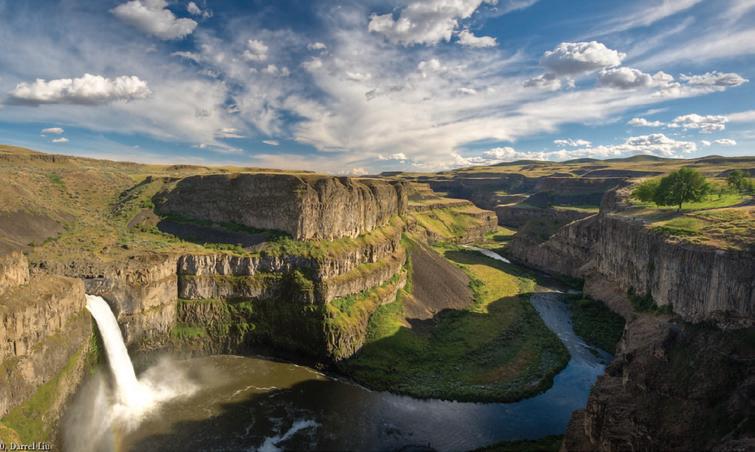From the Editor

Many Catholics are familiar with the doctrine of discovery—15th-century papal bulls that provided European nations with the legal and religious authority to invade and possess non-Christian lands. By planting its flag on this “new” land, the doctrines said, Christian European nations acquired not only sovereign rights over that land, but also the right to govern any non-Christian people on it.1
What many white U.S. Catholics are only beginning to grapple with, however, is the fact that the legacy of the doctrine of discovery is alive and well. It is codified into U.S. property law: The 1823 Supreme Court case Johnson v. Mcintosh effectively ruled that Native people did not have the right to own property.2 That case was quoted as recently as 2005, in Supreme Court Justice Ruth Bader Ginsberg’s majority opinion writing in City of Sherrill v. Oneida Indian Nation of New York.3
As JoDe Goudy, former chairman of the Yakima Tribal Council and the founder and owner of Redthought, points out in this issue of A Matter of Spirit, “This system of domination used by the Roman Catholic Church centuries ago to justify their dominion is still being used by the U.S. Supreme Court today. This is the legal foundation from which the United States has continuously asserted its claimed right of domination over all the land, territories, waters, animals, plants, and those they deem to be heathens and infidels.”
The articles in this issue grapple with the lasting legacy of the doctrine of discovery—both in U.S. society at large and in the U.S. Catholic Church. First, both Goudy and Ione Jones, in their articles, tell the story of the doctrine of discovery and its impacts “from the shore,” as Goudy puts it. “I am standing next to my ancestors in 1491, looking at the ships coming toward us, as I understand the totality of the impact this way of thought has had,” he tells me in an interview. One way Catholics can work to make reparations for these centuries of domination and the breakdown of right relationships with both the land and other people
1 Sal Sahme, “Lies of Discovery,” Oregon Humanities, April 27, 2021, https://oregonhumanities.org/rll/magazine/possession-spring-2021/ lies-of-discovery/.
2 “1823: Supreme Court rules American Indians do not own land,” Native Voices, National Institutes of Health, Accessed June 24, 2024, https://www.nlm.nih.gov/nativevoices/timeline/271.html.
3 Dana Lloyd, “City of Sherrill v. Oneida Indian Nation of New York,” Doctrine of Discovery, October 19, 2022, https://doctrineofdiscovery. org/sherrill-v-oneida-opinion-of-the-court/.
“ In practice, land justice means centering people and communities who have historically been deprived of their right to land and territory.”
that Goudy talks about in his interview is through involvement in movements for land justice and Indigenous sovereignty.
As Jones writes, “Indigenous sovereignty is more than a legal or political concept; it is a way of life rooted in Indigenous knowledge, values, and relationships with the land.” In practice, land justice means centering people and communities who have historically been deprived of their right to land and territory. It can mean taking part in a canoe journey with Jones’ organization, KHIMSTONIK; supporting IPJC’s Sacred Salmon campaign (see pages 8–9); making monetary reparations to Indigenous tribes through a program like Real Rent Duwamish4; or otherwise working to build an ethic of repair in our relationships with Native peoples.
The other writers in this issue explore how Catholics are wrestling with the lasting impacts of the doctrine of discovery and their own relationship to U.S. land and what the beginning steps to righting relationships might look like. In “An Ethics of Accountability,” Elisha Chi places movements for land justice within the context of Catholic social teaching and offers some suggestions for communities that already acknowledge their place on Indigenous land but seek to go further. In “Choose Solidarity, Not Guilt,” Tess Gallagher Clancy wrestles with her own complicity in the destruction of Native communities and offers a model for how to both love the land where your ancestors have lived and died while working toward restoring right relationships with those who originally lived there.
The articles in this issue ask readers to acknowledge their own involvement in the doctrine of discovery and colonization and provide suggestions for how to start doing the work of righting the relationships that have been broken for centuries. I hope that everyone is both challenged and inspired to deepen their involvement in, as Goudy says, “[overcoming] the greatest system of domination that’s ever existed and [creating] something better.”
—Emily Sanna, Editor
4 Real Rent Duwamish. Accessed June 24, 2024, http://www. casadecalexico.com/band.https://www.realrentduwamish.org/.
